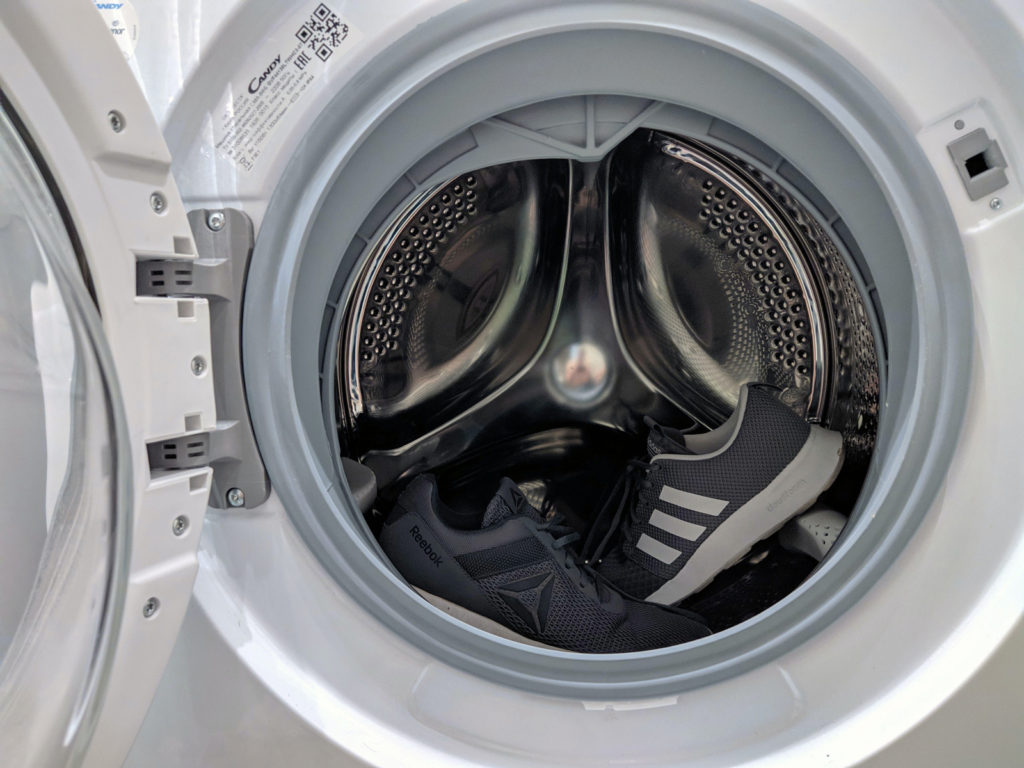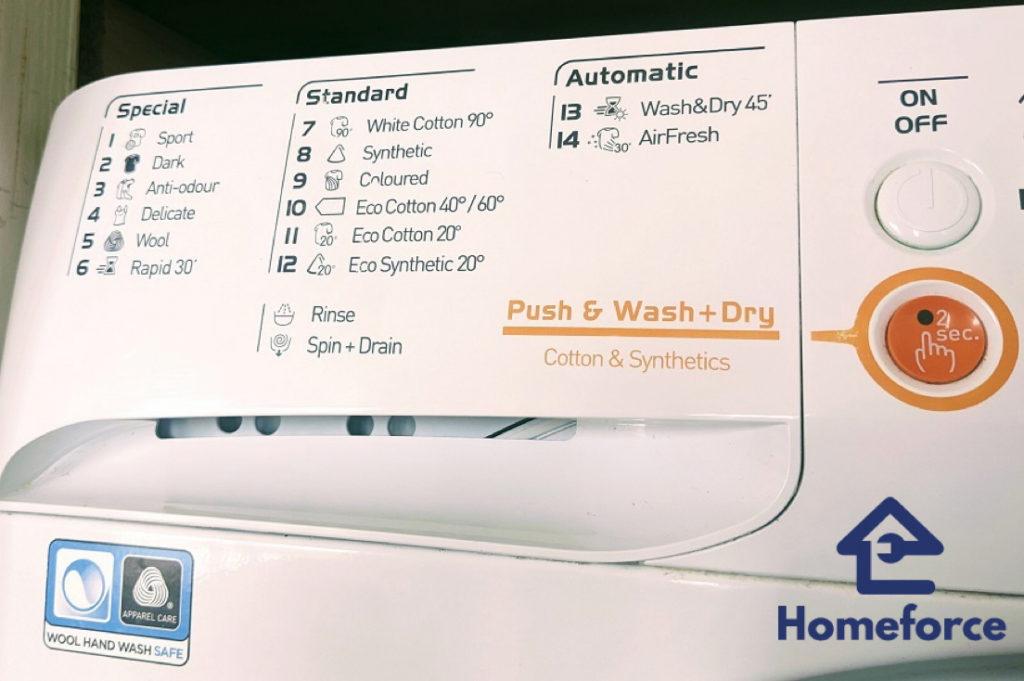Written On
Fri 28th October 2022
Written By
Homeforce
Category
Guides
Share This
Getting your laundry done is important, but it can be tricky having to use two different machines to get the job done.
You may be short on space or even time, and having to do two loads is just inconvenient.
A washer dryer is a single machine that both washes and dries your clothes, making laundry day a lot easier. But how do these machines work?
As experts in appliance repair here at Homeforce, you can guarantee we will be able to help you find the real answer!
So before we head into detail, let’s start first with the mini answer.
A washer dryer works by combining both washing and drying into one appliance. A drum to place your clothes and detergent is filled with water to wash your clothes. Once the cycle is complete, the water is drained away and your clothes are ready to be dried.
Ok so now we’ve got a quick takeaway, so you can understand more about how washer dryers work by finding out exactly what a washer dryer is.
What is a washer dryer?
A washer dryer is a washing machine and tumble dryer in one appliance which means it can both wash and dry your clothes in one go.
They are generally smaller than having two separate appliances and so are ideal for people who have limited space in their home or apartment.
This means that you can put your dirty clothes into the machine, select a cycle, and then have clean and dry clothes at the end of it.
There are two types of washer dryers which work in different ways. Some vent to the outside and other types don’t.
Venting washer dryers are more expensive, but they’re also more efficient since they remove the moisture from your clothes more effectively.
Non-venting washer dryers don’t need to be vented to the outside. They work by heating the air inside the drum, which then circulates and dries your clothes.
Non-venting washer dryers are less expensive, but they’re not as effective at removing moisture from your clothes.
But like any type of kitchen appliance, they can also have upsides and downsides.
Washer dryer pros and cons
Let’s take a quick look at some of the pros and cons:
Pros:
- You can wash and dry your clothes in one very convenient appliance.
- They are generally smaller and more compact than having two separate appliances. This means they take up less space in your home and are ideal for people who have limited space.
- They generally use less energy than two separate appliances.
Cons:
- They can be more expensive than buying a washing machine and tumble dryer separately.
- The capacity of washer dryers is usually smaller than standalone washing machines and tumble dryers so they might not be suitable for large families.
- They can take longer to wash and dry your clothes than two separate appliances.
- Some people find them noisy.
There are many different types and models of washer dryers on the market, so it is important to do your research before you buy one.
You will need to think about the size of the machine, the features that you want, and how much you are willing to spend.
So how do they work?
How washer dryers work
A washer dryer works by using a combination of washing and drying cycles.
Although the features can change from model to model, most washer dryers work similarly.
The clothes are loaded into the machine, water is added, and then the clothes are agitated to clean them.
Your laundry is soaked in a detergent solution and then rinsed with clean water, in the same way as a traditional type of washer.
The spinning action of the washer dryer then removes most of the water from the clothes before they enter the drying cycle.
After this, the water is drained away and the clothes are dried using either hot air or a tumble dryer.
To get a little more technical, washer dryers use a process called ‘centrifugal force’ to remove water from your clothes in the spin cycle, similar to a general washing machine.
This is where the washing machine’s drum rotates quickly, throwing the clothes against the sides of the machine.
The centrifugal force removes most of the water from your clothes, meaning they will dry more quickly.
Once the washing cycle has completed, hot air is used to remove any remaining water from your clothes.

How does the dryer part of a washer dryer work?
The dryer part of a washer dryer uses something called the “evaporative process.”
This is when water is converted into vapour by using heat. The hot air has circulated the chamber and through your clothes, evaporating any water droplets.
Some washer dryers also have a ‘steam’ setting. This uses steam to remove wrinkles and freshen up clothes without washing them.
This works by heating water until it turns into steam. The steam is then used to relax the fabric fibres in your clothes, which removes wrinkles and freshens them up.
Can washer dryers just dry clothes?
Yes, most combo washer dryers have a “dry only” cycle.
This cycle is typically shorter than a full drying cycle.
Some models also have an air-dry or air-fluff setting that doesn’t use heat, so it’s ideal for delicate items.
Do washer dryers dry clothes properly?
Washer dryers are effective at drying clothes.
However, you do need to make sure that you choose the correct cycle and settings.
Most combo washer dryers have sensors that adjust the drying time according to how wet your clothes are, so they don’t over-dry or damage your clothes.
Also, combo washer dryers often don’t get as hot as a standard tumble dryer, so your clothes may take longer to dry completely.
This is because the washer element of the machine cools down the air as it dries your clothes.

Can you just wash clothes in a washer dryer?
Yes, you can wash clothes in a combo washer dryer without using the drying cycle.
This can be a good option if you’re short on time or if you don’t want to put your clothes through the drying cycle.
So what are the pros and cons of a washer dryer?
What to think about when buying a washer dryer
Any kitchen appliance is an investment so it is important to do your research before you purchase.
Some things you may want to consider when purchasing a washer dryer include:
- How big is your laundry space? You will need to make sure that you have enough room to store the machine when it is not in use.
- How much laundry do you typically have? A larger washer dryer may be necessary if you have a lot of laundry to wash at one time.
- What types of fabrics will you be washing? Some machines have different settings for different fabrics.
- Do you want a machine that is energy efficient? This can help to save you money on your utility bills.
- What your budget is?
- Putting in place a suitable plan to ensure the unit is covered for repairs.
If you are unsure about which washer dryer to buy you could read online reviews or of course, speak with a salesperson at a store.
Combo washer dryers can be a great addition to your home if you are limited in space.
These machines can wash and dry your clothes in one unit, which can save you time and energy.
Make sure you will want to choose the right one for your needs.
Some manufacturers that offer washer dryers in the UK include:
- Samsung
- LG
- Bosch
- Miel
- Hotpoint
How much is a washer dryer?
The price of a washer dryer can vary depending on the size, features and brand.
You can expect to pay anywhere from £200 to over £1000.
A mid-range one for sale in the UK is made by Hotpoint and is around £500.
How washer dryers work – Summing up…
They are simple, and effective and save you time by doing both washing and drying in one go! Knowing how they work can save you even more time, and ensure your clothes come out clean and dry every time.
So take some time to read our helpful article and you’ll be using a washer dryer like a pro! Don’t forget to get in touch with one of our friendly team if your washer dryer is not performing as it should. With a nationwide team of appliance engineers, we can get you up and running again in no time.